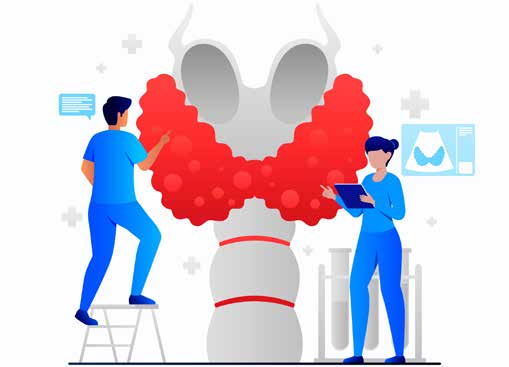Thyroid disorders are on the rise in India & have become common. Resulting from abnormal
levels of thyroid hormones these disorders are likely to affect the most productive phase in
our lives. Low levels of awareness & lack of screening are equally responsible for this growing
burden.
A state of complete physical, mental, and social well-being is called health. Our daily lives are
greatly impacted by our state of health. There are many different ways of living that can cause
hormonal imbalance and have different effects on health, typically the thyroid gland.
The thyroid is a gland in the neck that produces thyroid hormones. It is in front of the trachea,
or the windpipe. The brain, heart, and digestive system are all regulated by thyroid hormonesthe chemicals produced by the thyroid gland. In addition, they are essential for healthy sleep,
normal metabolism, energy levels, and weight. Additionally, these hormones are crucial to the
growth and development of infants and children.
A person is said to have a thyroid disorder if the functioning of the thyroid gland is abnormal.
Too less – called Hypothyroidism
Or
Too much – called Hyperthyroidism
Causes for abnormal functioning of the thyroid gland range from nutritional deficiencies,
inflammation of the gland, thyroid cancer etc. The different features of Hypo and Hyperthyroidism
are enumerated in the chart given in the next page.
| HYPOTHYROIDISM
(decrease in level of thyroid hormones) |
HYPERTHYROIDISM
(increase in level of thyroid hormones) |
| Weight gain |
Weight loss |
| Fatigue |
Anxiety |
| Decreased heart rate |
Increased heart rate |
| Cold intolerance – feeling cold easily |
Heat intolerance – feeling hot and sweaty |
| Increased sleepiness |
Difficulty sleeping |
| Dry hair, dry skin, Hair loss |
Palpitations- feeling one’s own heart beats |
| Depression |
Tremors in hands |
| Increased bleeding during menses/ increase in frequency
of menstruation. |
Decreased bleeding during menses/ not getting menses for
prolonged period |
| Infertility |
Loss of libido / impotence |
Doctors will direct you to get blood tests to determine the thyroid hormone levels in your blood
(such as TSH, T3, T4). Depending on other accompanying symptoms you may also be advised
an ultrasound of the neck, radioactive iodine uptake test, thyroid antibody tests or biopsy of
the gland.Treatment for a thyroid disorder is initiated as soon as a diagnosis regarding its
presence and cause is made. You will be advised to take thyroid hormone supplements orally
if you have hypothyroidism. Your doctor will need to check your blood on a regular basis to
see if the dose of thyroid hormone supplementation that was given to you is sufficient for you.
If you have hyperthyroidism, you will be prescribed medications to suppress the gland’s activity.
Blood tests will be required on a regular basis to check if the activity has been adequately
suppressed.
Certain important points to remember while taking thyroxine (thyroid hormone supplementation)
-
- Take a tablet on an empty stomach at the same time every morning. Wait for half hour before consuming any food or beverage.
- Do not change the brand of thyroxine or dosage of the tablet without consulting your physician.
- Do not stop your tablets on your own.
- If you start experiencing any symptoms of hyperthyroidism or there is recurrence of hypothyroid symptoms, consult your doctor immediately.
Hypothyroidism and Pregnancy:
Hypothyroidism during pregnancy can result in stillbirth, growth retardation,
premature birth, placental abnormalities, low IQ, and low birth weight.
Thyroid hormones are very important for the growth and development
of the foetus while it is in the mother’s womb. Therefore, if you intend
to become pregnant, it is essential to have your thyroid hormone levels
evaluated.




